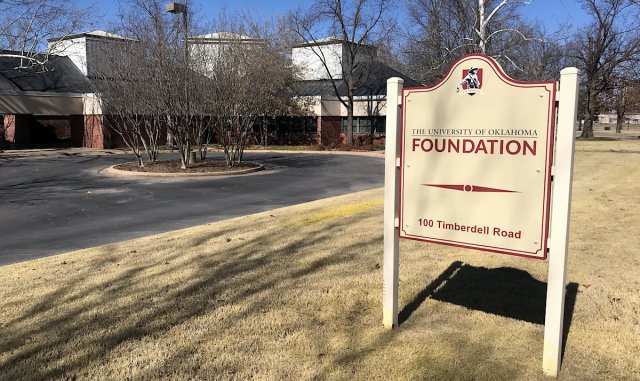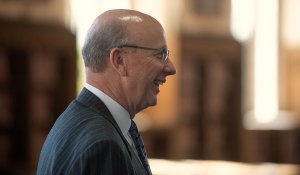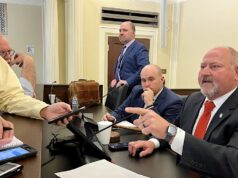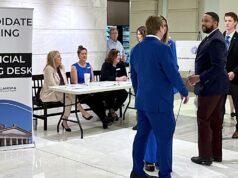The University of Oklahoma Board of Regents is set to vote Friday on a proposal to move OU’s entire fundraising and “university advancement” operation under the OU Foundation. A nonprofit entity founded in 1944 for the sole purpose of supporting the university, the OU Foundation argues it is independent and not subject to the state Open Records Act. Others disagree.
The proposed transition would be a significant change to the university’s already complicated relationship with its foundation. More than 60 state employees will become foundation employees, and the move will limit the public’s ability to review OU’s university advancement efforts, which were scrutinized by former President Jim Gallogly for the misrepresentation of in-kind software donations as more than $508 million in cash gifts.
In 2019, OU reported its data misrepresentations to U.S. News & World Reports, which responded by dropping the university in its national rankings. Journalists and others have sought records related to the controversy, as well as clarity about how funds were handled between the Office of University Development — rebranded afterward as the Office of University Advancement — and the OU Foundation.
Now, OU’s proposal to move its advancement arm underneath its nonprofit foundation would follow in the footsteps of Oklahoma State University, which took similar action more than a decade ago. Other universities around the country have done the same, including the University of Colorado, which subsequently found its foundation embroiled in a controversy about transparency in the early 2000s.
In more recent years, reports revealed that the Charles Koch Foundation signed donor agreements with the private foundations of Florida State University, George Mason University and others. The George Mason agreement granted the Charles Koch Foundation influence over certain university decisions, a controversial revelation that changed how both entities operate.
As of 2020, Nevada is reportedly the only state whose statutes specify university foundations as public bodies.
OU Foundation seeks exemption from Legislature
Meanwhile, the OU Foundation has tried unsuccessfully for two years to convince leaders of the Oklahoma Legislature to pass a bill specifically exempting university foundations from the Oklahoma Open Records Act.
This year, OU Foundation representatives requested that at least one legislator file a bill carving out an Open Records Act exemption. In addition, NonDoc obtained a March 2020 letter addressed to legislative leaders asking for university foundations to be exempted from the transparency statute.
“From time to time, the OU Foundation receives requests for information and documentation from persons asserting that the OU Foundation is subject to the requirements of the Oklahoma Open Records Act,” OU Foundation Vice President and General Counsel Keith Peters wrote March 5, 2020. “In response to such requests, the OU Foundation advises the requesting party that the OU Foundation is a private, independent organization and is not subject to the ORA. In 2018 and 2019, after declining to provide documents in response to such a request, the OU Foundation was forced to defend a lawsuit claiming the OU Foundation was subject to the ORA.”
In 2018, Lynda Gipson, the spouse of former OU General Counsel Fred Gipson, sued the OU Foundation in an attempt to declare it a public entity and part of the university based on its use of government mail privileges, its check requesting and depositing practices, and other connections.
The lawsuit, which stemmed from Fred Gipson’s request for information about the proposed development of a new basketball arena and other commercial enterprises in north Norman, was ultimately settled. But the plaintiffs alleged:
The university as a public institution receives taxpayer dollars and the public therefore has an interest in the administration and operation of the university. The foundation’s stated goal, and only function, is to advance the educational purposes of the university. To this end it solicits, receives and spends money and other assets on behalf of the university. The public has a legitimate interest in the university’s operations which logically extends to the operations of the foundation.
‘Answerable only to its donors’
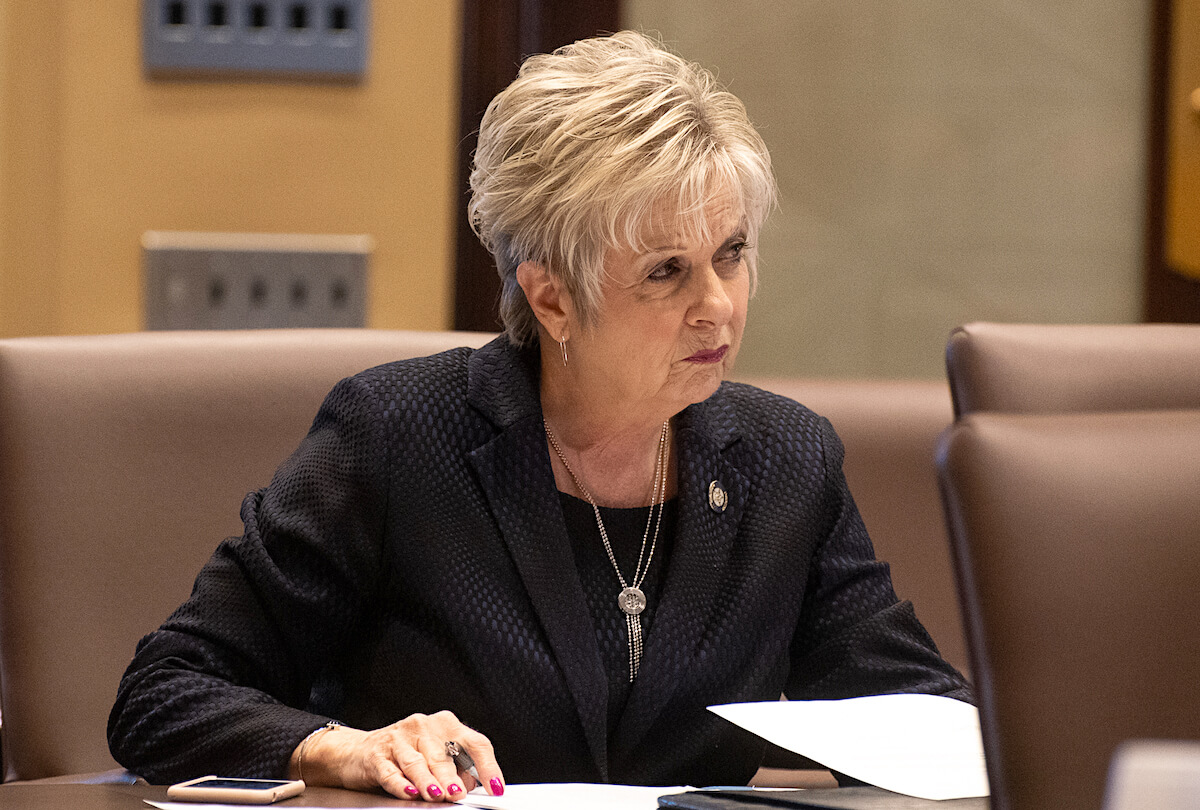
Gipson’s court filing included a letter in which OU Foundation President Guy Patton denied Gipson’s request for records. In the letter, Patton says that “donations to the foundation are for the benefit of the university but are not available for the general purposes of the university.”
“The university is not accountable for, and does not have ownership of, any of the assets of the foundation or the financial and capital resources of the foundation,” Patton wrote. “The foundation exists to benefit the university but, in the final analysis, the foundation is answerable only to its donors — not to the university (or the general public).”
That statement sits poorly with Sen. Julie Daniels (R-Bartlesville), an OU graduate who serves as chairwoman of the Senate Judiciary Committee.
Daniels said OU Foundation representatives asked her to file a bill this year exempting university foundations from the Open Records Act, but she declined to file it after asking questions about OU’s plan to move its entire fundraising and development operation under the OU Foundation.
“My reaction is they create records that they don’t want the public to see, and they believe moving it to the foundation will achieve that goal,” Daniels said. “But we haven’t exempted them from the Open Records Act. They are still subject to the Open Records Act until we do something about it. That’s my opinion.”
Daniels, who has donated to OU and supports scholarship funds at the OU Foundation, said the recent issues about donation reporting mean more eyes need to be on the university, not fewer.
“Given all the troubles my alma mater has had in the past few years, it just concerns me,” Daniels said. “This concerns me as an alumna, a donor, a taxpayer and an elected official.”
An informational item contained in the OU Board of Regents’ September 2018 meeting minutes describes the gift-reporting errors identified by the Gallogly administration:
The university erroneously misclassified philanthropic gifts in its 2015-2017 annual reports to the Voluntary Support of Education (VSE) survey, the authoritative source of data on charitable giving to higher education. In contravention of survey guidance and industry-standard principles, the university treated two very large in-kind gifts of industry provided software as cash-equivalents valued consistent with donor provided valuations. While such gifts are an important part of the university’s philanthropic efforts and greatly benefit both the student experience and the University’s research efforts, those gifts are more appropriately reported as in-kind contributions and valued at much lower amounts under guidance provided by the Council for Advancement and Support of Education (CASE) reporting standards.
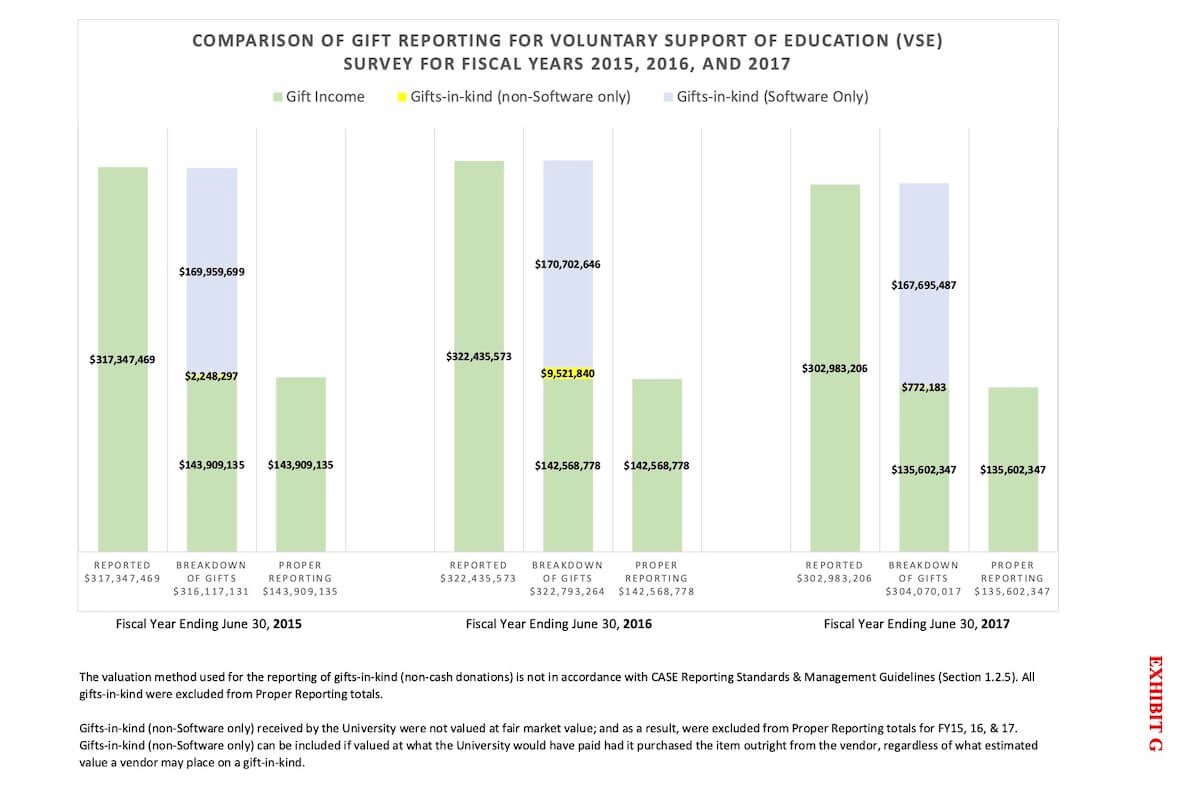
‘The attempt to shield all of this information’
At the top of the OU Office of University Advancement’s “how to give” website, the following disclaimer appears and illustrates the already complicated relationship between OU and its foundation: “All gifts are made through the University of Oklahoma Foundation, which receives, administers, invests, and distributes private gifts to OU.”
That means fundraising campaigns run and donations accepted by OU have been directed to the OU Foundation. But records related to the Office of University Advancement’s work are currently public record within certain limitations. Approval of Item 22 on Friday’s Board of Regents agenda would seem to change that considering the foundation’s interpretation of its own status. However, the issue could ultimately find its way back to court if legislation is not passed favoring the foundation’s privacy.
Daniels said any change to the Open Records Act should be carefully considered, and the timing of OU’s legislation request combined with the proposed organizational shift posed a problem for her.
“Moving the office of University Advancement under the Foundation isn’t really the issue here,” Daniels said. “It’s the attempt to shield all of this information from the public, which ties back to the bill they wanted run.”
Daniels, who said she cares deeply about her alma mater, said different states have different transparency rules for university foundations.
“It’s kind of all of the map,” she said. “Some states do make them exempt, some states do not.”
House Majority Floor Leader Jon Echols (R-OKC), who was CC’d on the OU Foundation’s March 2020 letter requesting the Open Records Act exemption, said he does not know enough about university finances to comment on the proposed transition of OU’s advancement services. That said, Echols believes universities should prioritize transparency.
“If we’re talking about university finance, we’re talking about taxpayer dollars (even indirectly),” Echols said. “Whatever we’re doing with it has to be open and transparent, wherever that funding comes from. If you’re not doing anything wrong, there’s nothing wrong with transparency.”
Echols said he routinely advises lawmakers and other public officials to own their actions and be prepared to explain decisions publicly.
“I’ve seen politicians, bureaucrats, members of boards — because they’re afraid they’re going to do something unpopular — try to hide what they’re doing, when the truth is that if they had just explained the hard thing they did, they would have had a lot more support than they did,” Echols said. “People are reasonable.”
‘Creating an unrivaled fundraising operation’
For their part, leaders of OU and the OU Foundation have begun speaking about the proposed shift in the days leading up to Friday’s Board of Regents vote. The seven-member board met for about nine hours in a closed executive during its January gathering, and it was scheduled to begin another lengthy executive session at 8 a.m. today.
“For well over a year, the university and the OU Foundation have engaged in an extensive analysis to determine the best strategy for creating an unrivaled fundraising operation that will support our strategic plan,” OU President Joe Harroz and OU Foundation President Guy Patton wrote Wednesday in a letter emailed across campuses. “To that end, this week we are asking the OU Board of Regents to approve the transition of University Advancement to the OU Foundation. The Foundation Board of Trustees approved this transition at its Feb. 5 meeting, and if approved by the OU Board of Regents, the transition will retroactively be in effect as of March 1, 2021.”
Patton also answered five questions from NonDoc on Wednesday in an interview arranged by Kesha Keith, OU’s director of media relations, who said she is also the proper press contact for the OU Foundation.

“This transition includes a move to a comprehensive fundraising model, which leverages an integrated model of raising philanthropic dollars for the university. All fundraisers will now be employees of the foundation,” Patton said. “By bringing all resources together in a single organization, it allows best practice technology solutions, business processes, and professional development with the goal of raising significantly more charitable dollars in support of OU’s strategic plan to be leveraged. There will still be an alignment of fundraising resources to benefit individual colleges, and the foundation will lease space from OU so that many fundraisers will still physically reside within the college they support. This transition allows college-based fundraisers to draw on the resources of the larger organization to enhance their success.”
The OU Board of Regents — which unceremoniously received Freedom of Information Oklahoma’s 2019 Black Hole recognition — will be asked Friday to approve three agreements between the university and the foundation: an operating agreement, an advancement services agreement and a transition agreement retroactively covering the period in February between the OU Foundation Board of Trustees’ approval of the change and Friday’s vote by the regents.
Beyond those agreements, however, “several ancillary agreements and arrangements” will be necessary.
“The ancillary matters include temporary and permanent lease agreements for the foundation’s use of university office space, an office sharing agreement, an intellectual property licensing agreement and temporary consulting agreements for specially impacted employees,” the agenda notes on Page 101. “The university and foundation will also need to identify and assign certain agreements and other matters from the university to the foundation. These include software licenses, websites and internet domains and social media accounts.”
RELATED
OU Board of Regents Chairman Gary Pierson talks executive session, legislative session by Tres Savage
Patton said OU owns the land and building that contain the OU Foundation’s headquarters, located at 100 W. Timberdell Road in Norman. OU leases the building to the foundation, he said.
“It is important to remember the OU Foundation building was built using only private monies raised by the then trustees of the foundation,” Patton said. “Once the building was completed, the trustees gifted it to the university in return for a long-term lease agreement.”
That connection, the new proposed agreements and the other issues discussed in Gipson’s 2018 lawsuit — including the “official mail” stamp previously seen on certain foundation envelopes — can cause the public to presume the OU Foundation is a public body, as Daniels contends.
But Patton said the stamp issue was an error.
“In all cases the foundation compensates the university for the services it consumes from OU, and that is also the case with postage,” Patton said. “The isolated instances of the ‘OFFICIAL MAIL’ stamp being applied to foundation mail was in error and once identified, was stopped immediately.”
Asked what he would tell lawmakers who might have transparency concerns about the proposed transition of OU advancement operations to the purportedly private OU Foundation, Patton said he considers the move a “best practice” in the arena.
“This does not impact transparency in any way, especially given existing privacy protections for charitable donors. The organizational model is very similar to that at Oklahoma State and nearly all of the other R1 public universities in our region,” Patton said. “The goal and the expectation is that this will bring more resources to benefit OU and thus be a force multiplier to the appropriated dollars provided by the Legislature enhancing the return on their investment in one of the great universities in our state. Furthermore, the foundation would hope that the state’s lawmakers would appreciate that OU is moving to a comprehensive model for fundraising that is broadly considered the best practice organization at public universities throughout the country.”
Asked if he believes university foundations should receive a statutory exemption from the Open Records Act, Echols — who received Freedom of Information Oklahoma’s 2020 Sunshine Award for promoting transparent government — said he does not know enough about the issue to say definitively yes or no.
“I can tell you in generalities I have a hard time believing I would support a carve-out to the Open Records Act in most any situation,” Echols said. “Carve outs in general are just a bad idea. They’re not just a bad idea for the public, they’re a bad idea for the individuals that are asking for them. Have some courage. Say why you’re doing what you’re doing, even if it’s difficult and hard. Go explain it. And in my opinion, that’s how we get faith in our institutions, not through carve outs.”
Full email from OU President Joe Harroz, OU Foundation President Guy Patton
March 3, 2021
Dear OU Community,
It’s been several months since we first unveiled our university’s bold path forward by launching Lead On, University, the strategic plan for the Norman campus. Since then, our momentum has escalated, and we are seeing incredible progress on a number of fronts.
Even before our plan was revealed last summer, we knew that for us to make great strides as a university community, a best-in-class alumni and fundraising operation would be required. Having this in place is essential for OU to grow, flourish, and ensure excellence and affordability. For well over a year, the university and the OU Foundation have engaged in an extensive analysis to determine the best strategy for creating an unrivaled fundraising operation that will support our strategic plan. To that end, this week we are asking the OU Board of Regents to approve the transition of University Advancement to the OU Foundation. The Foundation Board of Trustees approved this transition at its February 5 meeting, and if approved by the OU Board of Regents, the transition will retroactively be in effect as of March 1, 2021.
In its nearly eight-decade existence, the Foundation has exclusively served the University of Oklahoma and the generous donors who support OU, making it uniquely equipped to give full attention to strengthening the fundraising enterprise. With this transition, the Foundation will adopt a best practice model, mirroring peer institutions that house successful fundraising organizations.
As a result of this change, University Advancement employees on all three OU campuses will become Foundation employees, pending final approval of the Regents. Over the last seven months, the Foundation has worked with affected employees on their specific circumstances regarding payroll and benefits, as well as their university colleges and centers, to ensure employees and their respective areas have the support they need during this transition.
We are confident this realignment will create a cohesive and strong fundraising structure that will support both the strategic priorities of the university as well as the colleges and centers by maximizing philanthropic support of their respective initiatives. Perhaps the largest single benefit to each college is an investment of additional capital into the fundraising enterprise that the Foundation Trustees have ensured. Through the realignment of priorities and heavily drawing from Foundation funding sources, there will be an immediate 30-35% increase in funding that will be invested primarily in human capital by significantly increasing the number of frontline fundraisers and scaling the organizational infrastructure commensurately. Ultimately, the focus will be on dollars raised today, along with creating a robust donor pipeline to ensure more dollars tomorrow.
Achieving a best-in-class fundraising program requires exceptional talent, and it’s essential that this reorganization is successful from the very start. To this end, we are excited to announce that Amy Noah will join the OU Foundation on April 1 as its new Vice President and Chief Advancement Officer. In this role, Amy will provide leadership to the Advancement teams across all three campuses, ensuring all fundraising efforts are coordinated and in support of the university’s strategic priorities. Amy spent over 18 years in development at Purdue University, having served as Vice President for Development at the Purdue Research Foundation from 2013 to 2020. Under her leadership, Purdue successfully raised over $2.5 billion as part of its seven-year Ever True campaign, including a record-breaking $517 million in fiscal year 2019. In 2014, Amy and her team launched Purdue Day of Giving, which accounted for $147 million over six years. In 2019, Purdue Day of Giving was celebrated as the largest single-day fundraising campaign in higher education for raising a total of $41.6 million. We are thrilled to welcome Amy to Oklahoma in the coming weeks, and we are confident that her expertise and enthusiasm will help propel OU to new heights.
For over 130 years, the OU family has demonstrated unparalleled generosity and loyalty to our university. This transition is an acknowledgement of the deep commitment of our alumni and friends, and helps channel their gracious resources directly toward our purpose of changing lives through an unparalleled, affordable education and innovative research discoveries that advance humanity.
Thank you for all that you do for our University of Oklahoma, and for your efforts to help us reach our greatest ambitions.
Live On, University,
Joseph Harroz, Jr.
President
University of OklahomaGuy Patton
President
OU Foundation









